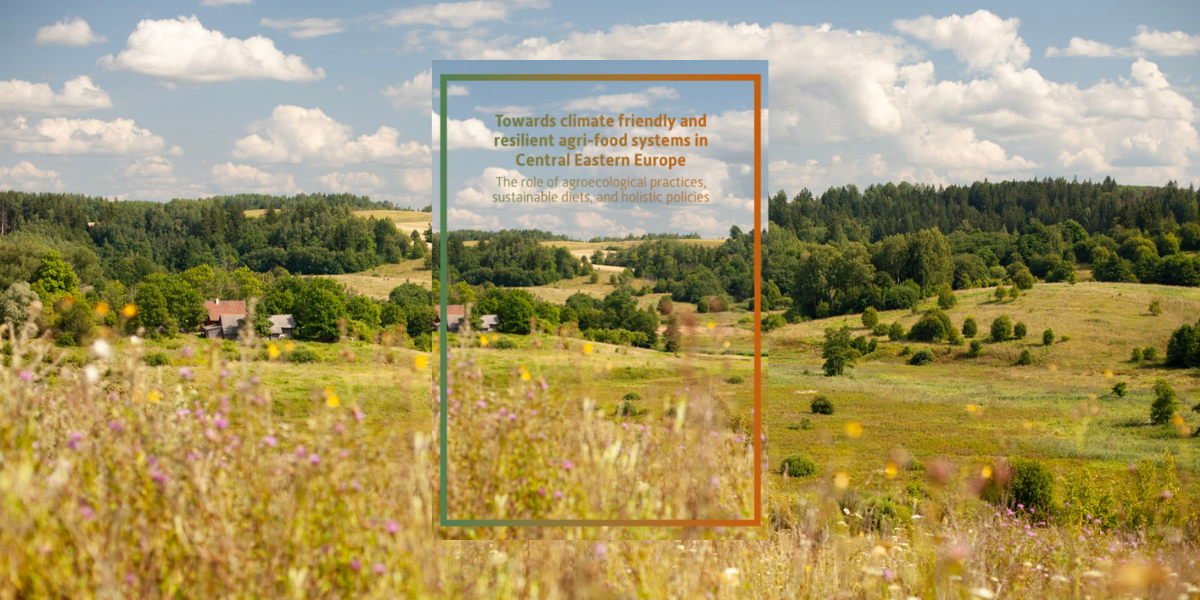AUTHORS: Ana Frelih Larsen, Antonia Riedel, Aaron Scheid, Julia Jägle (Ecologic Institute); Krystyna Springer, Julia Bognar (IEEP); Jeremy Wiltshire, Dave Freeman, Felicity Crotty (Ricardo)
This report provides inspiration for stakeholders in Central Eastern European countries to pursue a more holistic and coordinated approach for transitioning towards climate friendly agri-food systems.
Approximately 13.2% of the EU’s total greenhouse gas (GHG) emissions come from the agricultural sector (Bognar & McDonald et al 2023), and globally the activities of entire agri-food value chain are estimated responsible for approximately one third of GHG emissions . Unlike the energy industry, and buildings sectors, which have reduced their overall contributions to GHG emissions in the past decade, emissions in agriculture have remained stable. While agricultural activities are also responsible for net LULUCF emissions in croplands and grasslands, the sector is also in a unique position in that land used for agricultural purposes can act as a carbon sink to remove GHG emissions through different practices. In addition to climate change, agriculture and food consumption are key drivers of biodiversity decline, environmental degradation and health costs associated with the currently dominant diets.
In light of these multiple challenges, there is a growing recognition and consensus that we urgently need to improve the sustainability of agri-food systems to address these multiple and interconnected crises. This report offers a framework for stakeholders in Central Eastern European (CEE) countries to pursue a more holistic and coordinated approach for transitioning towards climate friendly and resilient agri-food systems. The 11 CEE countries – Bulgaria, Croatia, Czechia, Hungary, Estonia, Latvia, Lithuania, Poland, Romania, Slovakia, and Slovenia – share historical and socio-economic similarities, but also challenges and opportunities that distinguish them from non-CEE countries.
Despite its significant budget, the analysis in the report reveals that the CAP continues to have limited positive impact for climate mitigation and adaptation in CEE countries and could be much better utilised to support the transition. Similarly, National Energy and Climate Plans (NECPs) in CEE countries do not reflect sufficient ambition for agriculture and land management, and hardly address dietary changes.
The report provides an overview of how the CEE countries are currently using the main policy instruments at their disposal – the Common Agricultural Policy (CAP) and the National Energy and Climate Plans – to support the sustainability transition in agri-food systems and identifies gaps and recommendations for their improvement. Moreover, drawing on available literature and good examples of designing food policies, the report provides an overview of policy tools that countries can use to speed up the process of moving towards more sustainable food consumption.
The report emphasises the building blocks for this transition:
- Transitioning towards agroecological practices and nature-based solutions, including organic farming, agroforestry, peatland rewetting and sustainable livestock production;
- Facilitating changes in consumer behaviour with shifts towards more sustainable diets; and
- Reducing food waste.
Key recommendations are outlined for strengthening the CAP and NECPs, and for promoting a coordinated and systemic approach that integrates production and consumption changes, supported by improved institutional capacities, research, and advisory frameworks:
- On the production side, policymakers must address farmers’ dwindling economic position in the agri-food supply chains, lacking incentives to take up alternative ways of farming, as well as knowledge, tailored advice, and research needed to support farmers in making the transition.
- On the consumption side, coordinated food strategies, dietary guidelines, support for sustainable public procurement and development of markets for organic foods and plant-based foods are some key instruments to support the transition.
CEE countries can still significantly improve the climate impact of the CAP Strategic Plans by: introducing environmental and climate ring-fencing for cross-cutting measures, such as investment interventions; introducing degressivity and capping instruments to facilitate a fairer distrbution of income support towards small-and medium-sized holdings; strengthen conditionalities around soil health and permanent grassland protection, landscape features, and peatland protection; tie coupled payments for livestock to clear environmental standards; strengthen funding and incentive levels for agro-forestry and peatland re-wetting through eco-eschemes; and improve the funding and design of ambitious agri-environment-climate commitments to further avoid deadweight requirements. Strategic dialogue and evidence-building to support a fundamental reorientation of the CAP post-2028 needs to be initiated.
Finally, the report calls for setting clear goals, building societal support, coordination, and capacities to facilitate the wider transition towards climate friendly and resilient agri-food systems in CEE countries.
Image by Zymantas Morkvenas

